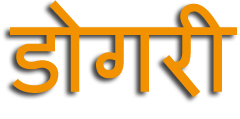Dogri was included in the 8th Schedule of Indian constitution on the historic day of 22nd December 2003. This was quite a satisfying occasion for Dogras in the sense that it did meet their long pending demand, but it can not be construed to be the achievement of a final goal, as is the perception of some less-informed enthusiasts.
Though Dogri Language is very old, finding earliest mention in Amir khusro’s Masnavi Nuh-e-Sipir in 1317 A.D, but Dogri literature is quite young. Literary writing in Dogri language started on a regular basis only in the Nineteen forties with the formation of Dogri Sanstha. Prior to this a vast treasure of folk oral literature was in place but there was hardly any written literature worth mentioning. It was through the unique initiative and persistent efforts of Dogri Sanstha, that a movement to write in Dogri picked up , which has fructified in the form of an impressive edifice of Dogri literature, covering all genres, quite comparable in quality and standard to the literature of any modern Indian language. Recognition of Dogri as an independent literary language by Sahitya Akademi, introduction of Dogri subject in School, College and Post graduate curriculum and then inclusion of Dogri in 8th Schedule of Indian constitution are some of the achievements basically due to the movement spearheaded by Dogri Sanstha. Sanstha is still pushing the cause of Dogri with full steam and in recognized as the premier literary organisation of the state.
The exponential increase in the number of Dogri books being published and the frequent literary and cultural activities are strong indications of the vibrancy of the language and the speed of development that this young literary language has attained. A number of dedicated and committed writers, young and veteran are engaged in enriching the literature of this language. Leaving aside this phenomenal literary progress, Dogri language at this critical juncture when streams of modern Technology and that of old social and cultural ethos of traditional India are intermingling, especially in the wake of strong winds of globalization , is faced with many challenges, most of which are common with other Indian regional languages but a few are Dogri specific only.
First let us take up those challenges which are Dogri specific. J&K is the only state of India, which has two of its regional languages included in the 8th schedule. That puts Dogri in a very peculiar situation. All avenues for promotion and development of a regional language of a state which open up through the intervention of state Govt. for languages included in 8th schedule, do not open up in a natural manner for Dogri. For example, in-spite of the national policy of imparting education to every individual in his/her mother tongue, Dogri is not even taught at primary level even as subject to Dogri speaking children, what to talk of imparting education in Dogri. On the other hand, clear cut orders have been issued by the Director , Education of Kashmir division to teach Kashmiri at primary level in the valley. This anomalous situation may be the result of skewed political dispensation in the state or could be due to the ignorance prevailing at the higher echelons of power.
State Govt’s apathy towards Dogri is also evident from the fact, that in-spite of demand of the students ,Dogri teachers have not been provided at secondary and higher secondary level in the schools of Jammu Division. Further syllabus of Dogri Subject in the Kashmir Administrative Service examination remains outdated and out of synchronization with what the students are taught at graduation level. Dogri is also getting a raw deal from Prasar Bharati.Though Jammu Radio Station has been declared a Dogri Station, no steps have been taken to see that the announcement of programmes are made in Dogri and chunk of Dogri programmes is increased. In the KASHMIR channel, beamed from Srinagar, which is representative of whole of the State, the share of Dogri Programmes is meagerly 2%.
There is no denying fact that no language can flourish and progress through the Government patronage only. The real strength of a language is the love and attachment of the people speaking that language. That love manifests itself through the zeal of the people to subscribe and read the newspapers, magazines and books published in that particular language. In this aspect Dogri’s condition is very dismal. People have least interest in reading Dogri books and magazines. Many of the political and social stalwarts who claim strong emotional attachment to Dogri do not have even a single Dogri book in their homes and are completely ignorant of the vast literary treasure existing in Dogri.
Language is a dynamic system like any living organism. Like any living organism it changes, absorbs , sheds, grows, develops or decays, and could die. This all depends on the people who speak and use the language. The ultimate responsibility of the health of Dogri language lies with the Dogras. The usage of a language in maximum aspects of life, i.e business, education, literature etc. makes the language vibrant and keeps on adding new vocabulary to it and keeps it going. The same holds true for Dogri. But the disturbing fact is that there is a false notion in the elite Dogra intelligentsia that Dogri language suffers from infirmities and if our younger generation adopts it as a medium of communication, then this would render it useless and irrelevant to modern technology and present day market driven industry. Instead of visualizing Dogri as a vehicle of progress of Dogras, the elite and upper educated class of the society has developed an attitude of apathy towards Dogri, which may ultimately push it to doom. Dogri language should be empowered to become a medium of progress by increasing its vocabulary to include all terminology required to deal with modern technology, industry and business.
The aspect of empowering the languages included in the 8th schedule through assimilation of new knowledge in them so that they can keep pace with the modern technology is not lost sight of by the Govt of India.The Govt. of India is clear that it is under obligation to take measures for the development of these languages , so that they grow in richness and become effective means of communicating MODERN KNOWLEDGE. As such the Govt. has floated various schemes and Projects through agencies like, Central Institute of Indian Languages, National Book trust etc. These Schemes and Projects provide avenues for enriching these languages, through publication, translation of Knowledge texts, and through developing contents on the Internet using user friendly low cost software tools in these languages including Dogri. The technology development for Indian Languages is a major thrust area, which would enable speakers of these languages to work on computers and Internet using their own language. In this respect Dogri has already made a major break through. Nine software programmes and tools in Dogri and an on-line Dogri-English Dictionary has been prepared and is made available on the Internet for public use. These software packages and Dictionary has been prepared by a team of Dogri Scholars and Computer Experts.
However the amount of work envisaged by the Government of India concerning preparing / translating knowledge material in Dogri in the area of Computer, Industry, Science, Commerce, social sciences etc. is huge and requires gigantic effort. What is required is highly motivated teams of Dogri scholars and Dogri knowing experts of Computer, Science, Commerce, Media , Management etc. to make use of the opportunities which have opened up by inclusion of Dogri in 8th schedule. The challenge is that can Dogri knowing youngsters who have expertise in English, Hindi, Science, Technology and Media be motivated to work in the field of Dogri language. If such a work force of talented people joins the movement of Dogri only then we can make use of these opportunities and can make Dogri language a vehicle of progress for Dogra community.











The author has made a valid point. First and foremost, the Dogras themselves must learn to love Dogri the way Tamil is loved by the Tamilians, or nearer home, Kashmiri is loved by the Kashmiris. Dogri Sanstha is making commendable efforts to this end
Definately right
Its very strange that Dogra people are teaching their next generation that speaking Dogri is a symbol of illitracy…This thinking is so annoying.Instead people Should teach to their next generation the value of their mother tongue. I feel it too sad that we Dogra people when go to other states we try to imitate their languages…for example when we move to punjab we try to speak in punjabi…Why don’t we speak in Dogri???
The primary need is to eradicate such thinking that its a vernacular language..Dogri is one of the sweetest languages.We must use it wherever possible.This will influence other’s too.
Dear Mr. Sumbaria,
Thank you for your comments and observations on my article entitled “Dogri Language: Challenges & Opportunities”.
However, I fail to comprehend that on which aspect of my article you have made these comments. I suggest that kindly read the article thoroughly and then make your comments.
With regards and best wishes
Lalit Magotra